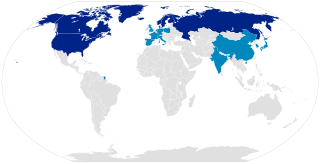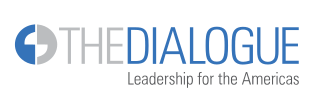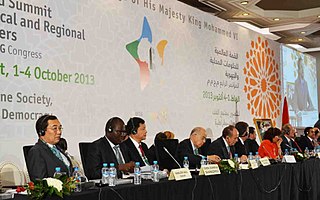Related Research Articles

The International Astronomical Union is a nongovernmental organisation with the objective of advancing astronomy in all aspects, including promoting astronomical research, outreach, education, and development through global cooperation. It was founded in 1919 and is based in Paris, France.
The International Council for the Exploration of the Sea is the world's oldest intergovernmental science organization. ICES is headquartered in Copenhagen, Denmark, where its multinational secretariat staff of 51 provide scientific, administrative and secretarial support to the ICES community. It was established on July 22, 1902, in Copenhagen.
The Intergovernmental Oceanographic Commission of UNESCO (IOC/UNESCO) was established by resolution 2.31 adopted by the General Conference of UNESCO. It first met in Paris at Unesco Headquarters from 19 to 27 October 1961. Initially, 40 States became members of the Commission. The IOC assists governments to address their individual and collective ocean and coastal management needs, through the sharing of knowledge, information and technology as well as through the co-ordination of programs and building capacity in ocean and coastal research, observations and services.

The Woodrow Wilson International Center for Scholars, located in Washington, D.C., is a United States Presidential Memorial that was established as part of the Smithsonian Institution by an act of Congress in 1968. It is also a highly recognized think tank, and was ranked among the top ten in the world in 2013.

The United Nations Research Institute for Social Development (UNRISD) is "an autonomous research institute within the United Nations that undertakes multidisciplinary research and policy analysis on the social dimensions of contemporary development issues". UNRISD was established in 1963 with the mandate of conducting policy-relevant research on social development that is pertinent to the work of the United Nations Secretariat, regional commissions and specialized agencies, and national institutions.

The Arctic Council is a high-level intergovernmental forum that addresses issues faced by the Arctic governments and the indigenous people of the Arctic. The eight countries with sovereignty over the lands within the Arctic Circle constitute the members of the council: Canada, Denmark, Finland, Iceland, Norway, Russia, Sweden, and the United States. Outside these, there are some observer states.

The United Nations Alliance of Civilizations (UNAOC) is an initiative that attempts to "galvanize international action against extremism" through the forging of international, intercultural and interreligious dialogue and cooperation. The Alliance places a particular emphasis on defusing tensions between the Western and Islamic worlds.
The North American Forum is an annual meeting of U.S., Canadian and Mexican government and business representatives to discuss issues related to continental economic and social integration. The Forum is chaired jointly by former United States Secretary of State George Shultz, former Mexican Finance Minister Pedro Aspe, and former Alberta premier Peter Lougheed.

The Inter-American Dialogue is a U.S.-based think tank in the field of international affairs primarily related to the Western Hemisphere. Headquartered in Washington, D.C it intends to "foster democratic governance, prosperity, and social equity in Latin America and the Caribbean". The Dialogue's research areas focus on the rule of law, education, migration, remittances, energy, climate change and extractive industries.
Ambassador Martha I. Lara is a prominent Mexican career diplomat and politician.
The International Network of Health Promoting Hospitals and Health Services (HPH) is a nonprofit, non-governmental organization that was initiated by the World Health Organization (WHO) in 1988. It is also known simply as HPH, or "Health Promoting Hospitals." HPH is based on the settings approach to health promotion philosophy of the WHO as outlined in the WHO Ottawa Charter for Health Promotion. The organization's main aim is to improve the health gain of hospitals and health services by a bundle of strategies targeting patients, staff, and the community.
Maastricht Graduate School of Governance (MGSoG) at Maastricht University is a public policy school. It offers a master's degree in public policy and human development and a doctoral degree in public policy and policy analysis, and conducts multi-disciplinary research in topics relating to economics, political science, international relations, and sociology. The School is the United Nations' first public policy graduate school, and one of the few public policy schools in Europe. The Times Higher Education World University Rankings 2016-2017 placed social sciences in Maastricht University 65th in the world. Its MSc in Public Policy and Human Development was ranked number four in the category of Political Science and Public Administration, according to the 2018 Keuzegids Masters.

Ayman Zohry is a demographer/geographer and expert on migration studies based in Cairo, Egypt. He was born in Souhag, Egypt. Zohry received his Ph.D. from the University of Sussex in 2002. He is a leading researcher in the field of migration studies in Egypt with a special focus on irregular migration.

The United Nations Department of Economic and Social Affairs is part of the United Nations Secretariat and is responsible for the follow-up to major United Nations Summits and Conferences, as well as services to the United Nations Economic and Social Council and the Second and Third Committees of the United Nations General Assembly. UN DESA assists countries around the world in agenda-setting and decision-making with the goal of meeting their economic, social and environmental challenges. It supports international cooperation to promote sustainable development for all, having as a foundation the 2030 Agenda for Sustainable Development and the 17 Sustainable Development Goals (SDGs) as adopted by the UN General Assembly on 25 September 2015. In providing a broad range of analytical products, policy advice, and technical assistance, UN DESA effectively translates global commitments in the economic, social and environmental spheres into national policies and actions and continues to play a key role in monitoring progress towards internationally agreed-upon development goals. It is also a member of the United Nations Development Group.

United Cities and Local Governments (UCLG) is an umbrella international organisation for cities, local and regional governments, and municipal associations throughout the world that is concerned with representing and defending the interests of local governments on the world stage.
The International Transport Forum (ITF) is an inter-governmental organisation within the OECD system. It is the only global body with a mandate for all modes of transport. It acts as a think tank for transport policy issues and organises the annual global summit of transport ministers. The ITF's motto is "Global dialogue for better transport". Between 1953–2007, the organisation had existed for over fifty years as the European Conference of Ministers of Transport.
The Global Forum on Migration and Development (GFMD) is a state-led, informal and non-binding process, which helps shape the global debate on migration and development. It provides a flexible, multi-stakeholder space where governments can discuss the multi-dimensional aspects, opportunities and challenges related to migration, development, and the link between these two areas. The GFMD process allows governments - in partnership with civil society, the private sector, the UN system, and other relevant stakeholders – to analyze and discuss sensitive issues, create consensus, pose innovative solutions, and share policy and practices.
The Global Forest Information Service (GFIS) is an initiative of the Collaborative Partnership on Forests (CPF) and is a collaborative effort of 14 major forest-related international organizations, institutions and convention secretariat, aiming to maximize the value of all forest information resources and providers worldwide through the sharing of forest-related information through a single gateway.
The Campbell Collaboration is a nonprofit organization that promotes evidence-based decisions and policy through the production of systematic reviews and other types of evidence synthesis. Campbell is composed of coordinating groups that coordinate the production of systematic reviews and evidence gap maps in the following areas: Business & Management, Climate Solutions, Crime & Justice, Disability, Education, International Development, Knowledge Translation & Implementation, Methods, and Social Welfare. It is a sister initiative of Cochrane, with secretariat staff in Oslo and New Delhi.
The Internet & Jurisdiction Policy Network, also known as "I&J Policy Network", "Internet & Jurisdiction, or simply "I&J", is the multistakeholder organization fostering legal interoperability in cyberspace. Its Secretariat facilitates a global policy process between key stakeholders to enable transnational cooperation and policy coherence. Participants in the Policy Network work together to preserve the cross-border nature of the Internet, protect human rights, fight abuses, and enable the global digital economy. Since 2012, the Internet & Jurisdiction Policy Network has engaged more than 300 key entities from different stakeholder groups around the world, including governments, the world's largest Internet companies, the technical community, civil society groups, leading universities and international organizations.
References
- ↑ "Activities of the Metropolis Project", Twelve coordination meeting on international migration (PDF), New York: United Nations Department of Economic and Social Affairs, February 20–21, 2014.
- ↑ "Innovation Case Study: Metropolis Project", The Innovation Journal, September 1999.
- ↑ Metropolis Professional Development Website .